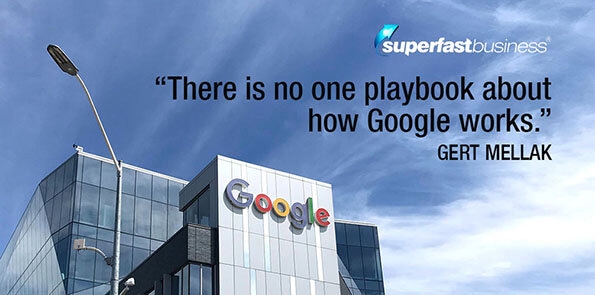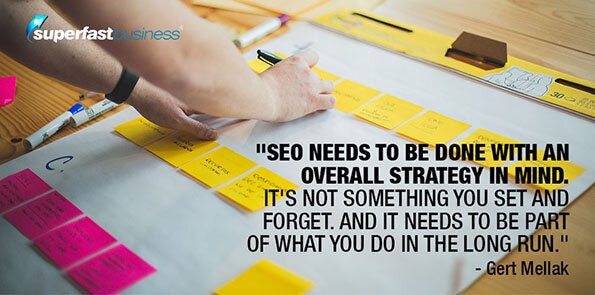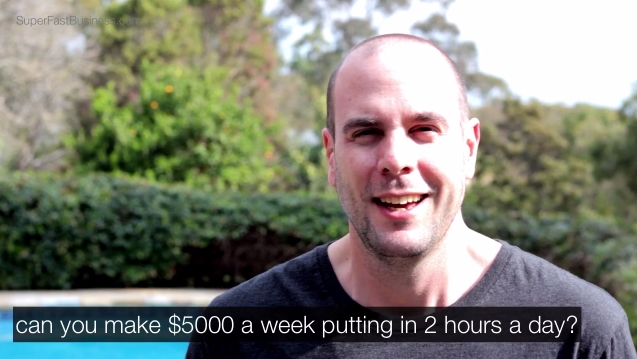As an internet business owner or entrepreneur, you know the importance of top ranking for a prospect’s search query. There's one SEO mistake, however, which might be costing your website traffic.
Our trusted SEO expert Gert Mellak returns to tell us what that mistake is, and what approach it takes to get the best returns from your SEO efforts.
Podcast: Download (Duration: 33:04 — 30.4MB)
Get Notified Of Future Episodes Apple Podcasts | Spotify | Amazon Music | Android | Blubrry | Gaana | TuneIn | Deezer | Anghami | RSS | More
Podcast highlights:
01:07 – Why trust is a big issue in SEO. Are you confident in your SEO agency?
04:16 – Behind the scenes of the website audit process. What’s involved in this crucial first step?
06:49 – The truth about SEO and link building. The thing most associated with SEO isn’t the whole story.
08:02 – Because it takes time to see results… SEO is not about quick wins.
09:20 – The other parts of the mix. If more links don’t win the battle, what else do you need?
12:25 – What happens with a few small changes. James shares the results of taking Gert’s advice.
15:13 – Knowing what your aim really is. If you know your marketing goals, you can make the right moves.
20:41 – The timeline to expect when you work with SEOLeverage. Gert lays out what they do and how long it takes.
22:56 – What’s changed SEO-wise on SFB. This is not the SFB of a year ago.
27:42 – Working with a long-term focus. Gert’s average client has been with him five years. What does that tell you?
29:48 – A common SEO mistake and what to do about it. Discover what you could be doing wrong and what your action steps should be.
Discover which parts of your business need work with James’s help
Could you be doing your SEO all wrong?
To answer this, James has brought back one of his regulars, Gert Mellak of SEOLeverage.com.
Why trust is a big issue in SEO
Gert is plugged into James’s team in Slack, monitoring their site and giving actionable input. He’s the SEO guy not just for James but for a lot of other SuperFastBusiness members.
Trust is a big thing in the SEO industry. Like any industry, it has its good and not so good practitioners.
In SEO, though, it can be hard to see what’s going on. And when SEO goes wrong, the consequences can be massive, as James observes. You can literally drop out of Google, and have a very difficult time recovering.
What’s the typical SEO agency practice? he asks Gert. And how do you know you’re dealing with someone trustworthy?
Obviously, says Gert, you don’t want to throw all agencies into the same bucket. He can base, however, on what he knows and what experiences clients have shared with him about services they’ve worked with.
It usually starts, he says, with a very bold promise – page one for all your keywords, something like that. Whenever an agency promises something, says Gert, it’s probably the first warning sign. You really can’t promise anything, because even Google sometimes doesn’t know what’s going on.
“You want to stay away from agencies promising too much.”
You want to stay away from agencies promising too much, because so many variables are out of their control, however hard they try to deliver.
Supposing an agency has the playbook for Google today, asks James, how long until that’s out of date?
 Google layers up different levels of their algorithm for every single search query, says Gert. So there is no one playbook about how Google works. The playbook is different for every single search query, and it usually changes every day.
Google layers up different levels of their algorithm for every single search query, says Gert. So there is no one playbook about how Google works. The playbook is different for every single search query, and it usually changes every day.
It really comes down to the specific situation, the specific query you want to rank on. And then also micro events have an impact. So there are a lot of things to look at, a lot of things to understand, and really no place to trust any guarantees you’re getting.
Behind the scenes of the audit process
When it comes to the framing of a potential prospect, what are the typical approaches? James asks. When he had an SEO business, they would look at a customer’s website and tell them if they thought they could help them or not. He knows Gert does an audit. Would he say it’s different from other’s processes? Or do all agencies do something similar?
Gert can just compare it with 10 to 30 audits his clients have sent over. They’ve found plain text files with a few SEO notes, priced at $1,500 to $2,000. They’ve found slideshows with no specific information, just copied slides of best practices, not specific to the situation.
What’s missing in many, many audits is a personalized approach where the agency really steps in and asks, What are you trying to achieve? Let’s see if SEO can be a part of this. And if it can, then let’s do a website audit.
An audit for SEOLeverage takes two weeks and involves four people, including Gert. They analyse all kinds of things from the website, making sure every one of those four people understands what the company is trying to achieve with their SEO.
They then provide four documents, plus a prioritized list of action steps based on effort and impact, so the client knows what to do first, what to do next, and what can wait, just to make sure that things really work.
This obviously goes beyond the tools with bot-generated results that people can subscribe to online, says James.
Absolutely, says Gert. The tools don’t know what you want to achieve. They don’t know you or your situation. What you want is someone who takes time to understand what you want, what you’re trying to achieve, and who makes sure that you understand why they’re going to approach it in a certain way.
The truth about SEO and link building
There’s a misconception that SEO equals link building.
Yes, says Gert. Many clients come with this perception from agencies. It’s sometimes the only thing they’ve been doing for SEO.
It is true that in the past, links moved the needle a lot in quite a few industries. They still matter, and Gert would probably roll it up the other way around. It matters what you have on the page, how you present it. Does this material correspond to your search intent? They build links when it’s the missing piece of the puzzle. Then they suggest, now let’s look into links. But first they try to tackle everything else.
James would liken a well-structured website to a glider. Link building would be putting engines on it and turning it into a plane. It would be very hard to fly an anvil, or an airplane with no wings.
Because it takes time to see results…
One thing that makes SEO hard is the time it takes to see results, says James. You can run a Facebook ad and know within the day if it works. You can post a direct response mail campaign and get the results in a week. With SEO, we could be talking months.
“SEO is a strategic decision.”
Gert agrees. That’s why you want to make sure you know why you’re getting into SEO. SEO is a strategic decision. If you want SEO to be part of what you’re doing, it shouldn’t be the only thing. It should be one pillar below your marketing strategy. You need to commit to it being part of what you do in marketing.
That means you’re going to dedicate resources to it. You’re going to make sure you create content, and you update that content. Even if your onsite is perfect today, you might need to go back next week when Google shifts gears and maybe tweaks a few things. A long article that ranks well today might not rank well next month, and you might need a shorter version of it.
So there needs to be a dynamic, a constant decision that SEO is going to be part of what you want to do. And it takes a few months to see the results.
The other parts of the mix
So what other things do Gert’s good SEO clients do as part of their marketing? And what resources is Gert talking about? James doesn’t mind using his own business as an example.
James’s situation, says Gert, is quite similar to other clients they have, where there’s someone who writing and optimizing written content, someone taking care of the images, someone who handles the website stuff, internal linking, image optimization, etc. Someone who takes care of the technical side – the website must be running, it must be fast. Those are the resources.
These people have to be able to focus on SEO, say maybe a day a week. It can’t be in conflict with other tasks on their plate.
As part owner in a recruitment business, James does often get clients looking for someone to do everything, an impossibility.
In their business, they’re quite responsive to Gert’s recommendations, whether it’s to add something to a page, to update something old, to make something longer or shorter. They recently updated a many-years-old article, and got some instant wins.
“More links aren’t necessarily going to win the battle.”
Many people are selling link subscription programs. And more links aren’t necessarily going to win the battle. You need to make sure what you’re linking to is good. And there is work involved.
There’s a lag, yes, between starting real SEO and seeing an ROI. But James’s site is getting traffic, people looking for things he has a solution for, without him running an ad.
And on top of that, says Gert, people doing research are more likely to convert when there are no ads, when they click on something because they like it.
What happens with a few small changes
As talked about in a previous episode, Gert told James to turn off a lot of his content. This was very counterintuitive. But it made the site more effective for Google. Google now don’t mind crawling it because it’s more useful, it’s not a waste of their resource.
 Absolutely, says Gert. You want to make sure that whatever page you hand over to Google really makes sense for them to crawl, index and rank.
Absolutely, says Gert. You want to make sure that whatever page you hand over to Google really makes sense for them to crawl, index and rank.
This is why, in their audits, they have a section that’s a content audit. They crawl the entire site and ask Google about every single URL, every single page they find: how often did this page come up in search? How many people clicked on it? What’s the clickthrough rate, etc?
They very often end up with hundreds of URLs. One client had 200 pages on their site that were useless for SEO. Then they had other URLs they wanted Google to crawl, but Google didn’t have the time.
Google allocates a “crawl budget”, or a processing time, to a site. And they sometimes crawl URLs you don’t expect them to crawl. They don’t necessarily crawl a page because you have it in your navigation. They might crawl a PDF document you have indexable, and crawl it every day for whatever reason they have in their algorithms.
“Where does Google spend their time?”
On sites, Gert and his team do a log analysis where they get to server log files that note down exactly which IP was accessing which site. This enables them to take a look at Google’s eyes from Google’s perspective, where does Google spend their time?
When they see Google spending too much time somewhere irrelevant for SEO, they can noindex that section and block access. That way Google can focus its time where they want it to.
On James’s site, they uncovered tag pages and category pages that did nothing for conversion. There were also pages with little or no visits. These were things they decided were better deleted, to lift the SEO quality of the site.
Knowing what your aim really is
What should the goal ultimately be? For James, it’s to rank for phrases that result in a sale. And to do that, the phrases they rank for should be relevant. And when people get there, they should have a logical next step which can result in them either opting into James’s email database, or buying something, which is what happens when someone opts in who’s a good fit for James and his product.
What Gert tries to have his clients understand is that people coming to a page that ranks really well might click somewhere else. Google wants people to have a good experience on your website. So if there are a lot of what they call thin content pages, like the result on an ecommerce site when it’s been filtered to the only product they have, that’s a poor user experience.
So Gert and his team try to work with clients so that wherever someone clicks on their website, they’ll have a good experience, for a start.
The second thing, he says, is that you want to watch out for the quality of traffic. They do this mostly with conversions. They make sure that the content that ranks also gets conversions. They’re not experts with conversion optimization, but they know a thing or two, and have actually gotten clients conversions out of their articles.
Then there might be articles that never convert. And if they don’t cater to a client’s target audience, they’re better noindexed. Because if Google ranks them, they bring in the wrong audience, they lower conversion rate, and they essentially associate the client with a field they don’t even want to be associated with.
Not everything on your website needs to be given to Google. Not every interview on a podcast needs to be indexable, because not every interview partner might be the perfect fit for your general audience. A tag page or a category page very often is not a good search result. Imagine, as a user looking for something, you come to a page with a list of articles. Now you need to decide which article might answer your search query. It’s not a good experience.
This SEO tactic is a mouthful
Gert talks about canonicalization. What is this? asks James.
It means, says Gert, you tell Google which URL you actually want to rank. Say you have a masterpiece post on SEO, and another, less important article on the future of SEO. You can put in a canonical and reference the URL of your masterpiece. That way Google knows that’s the post you want to rank.
The timeline to expect when you work with Gert
When you engage the services of SEOLeverage, you can expect to start with an audit. This takes roughly 10 days, where Gert and his team do keyword research, competitive research, analyze the website, analyze the backlinks, get an idea what is happening, what is working, what is not working, how competitors get the traffic, all these kinds of things.
 When they have the audit, they come up with a list of action steps. These they split up based on impact and effort. Because once you know that something has high impact, low effort, it’s a low-hanging fruit, and you want to do it first.
When they have the audit, they come up with a list of action steps. These they split up based on impact and effort. Because once you know that something has high impact, low effort, it’s a low-hanging fruit, and you want to do it first.
They indicate priorities where Gert will say, This is where you should start, this is what you should do next, this is what you should do next. This involves a complete theme change. Let’s put this at the back of the list because it involves some heavy lifting.
Some clients then take the audit and have their own team, their own SEO maybe on the team, and work on those things. Many clients want some ongoing guidance, and this is where Gert’s framework comes in. The ERICA framework has been mentioned on other episodes, and Gert has a book by the same name if you want to check that out.
What’s changed SEO-wise on SFB
If you look at the page for this episode, you’ll find something different from what a post would have looked like some years ago. Back then, it would have contained the entire transcript. Gert, however, told James too many words could water down the relevance of the content.
So what you’ll find now is a summary of the episode, with a timeline of topics. This digest is keyword-driven, and conversion-driven. It hopefully entices people to listen to the podcast, to get the most value from it. And there is a prompt to download the transcript for one’s email address, so that people can stay in the loop and be informed of new episodes. Most of the podcasts also have a call to action.
Many people have told James they like the new digest style. And what’s good for customers can often also be good for Google. Is that a fair comparison? he asks Gert.
Absolutely, says Gert. Podcast episodes themselves have their platforms, where the audio is the important part. But when you want your podcast to rank in search, you need to consider, how many people doing a search on Google are prepared to take in a 40-minute podcast episode to solve their problem?
Most of us are looking for a specific answer. Most of us want to skim an article, find our answer, find our reference, find our recommendation, and then we’re happy. Many people don’t want to have to listen to an entire episode, or read through a transcription.
James’s posts also link between episodes where the same guest has been. They have series, which Gert suggested – clusters of relevant posts from the same expert. There’s a rotation of Gert, Charley, John, Will, Ilana, and so forth, who keep coming back. And they go deeper and deeper into topics, and it’s like having several podcasts in one. And they interlink, and over time, they’re building up a sort of strong armory of what Google wants to see, of evidence that there’s some authoritative content there.
Helping things along with an app
SEOLeverage has an app clients can access, where they can track performance according to the marketing goals set. There’s quite a lot of transparency there. And seeing results is encouraging.
It’s helpful, says Gert, for James and other clients just to know why things do matter. His methodology is quite different from what most SEO agencies do, that minimize content, minimize touchpoints with clients. Gert and his team take a very opposite direction.
He doesn’t need anybody to know the details about SEO. He’s geeky enough to figure those out. But he does need every client to understand why things are important.
Working with a long-term focus
Gert’s focus is really long-term. His longest client has been with him for 16 years; his average client, four or five years. They’re with him because they know what he’s doing makes sense in their context, and what his team does makes sense for their goals.
When a client comes in, they spend quite some time with them, figuring out, what is their goal, and how can SEO achieve that goal? And what’s the overall strategy that’s going to bring them closer to the goal?
Every couple of weeks, with the application behind it, with the framework guiding what they do, the methodology, they move step by step closer to the goal. The goal is a moving target, but they’re closing in. They’re getting short-term results, they’re ranking for more keywords. A keyword that used to rank on page eight, may now be on page two. Even if the ultimate goal is a long-term goal, there are things moving, and the application keeps track of those.
A common SEO mistake and what to do about it
So what is the mistake that many people make with SEO?
 The mistake, in Gert’s point of view, is not seeing an overall purpose of SEO in the strategy, but merely ticking boxes in a plugin or pushing content out every week and thinking it’s enough for SEO. SEO is very complex, it needs resources. SEO needs to be done with an overall strategy in mind. It’s not something you set and forget. And it needs to be part of what you do in the long run.
The mistake, in Gert’s point of view, is not seeing an overall purpose of SEO in the strategy, but merely ticking boxes in a plugin or pushing content out every week and thinking it’s enough for SEO. SEO is very complex, it needs resources. SEO needs to be done with an overall strategy in mind. It’s not something you set and forget. And it needs to be part of what you do in the long run.
And Gert’s recommended action steps?
Consider what role SEO has in your business. Does it have dedicated resources, where you know it’s being worked on? First of all, obviously, define if SEO should be part of the plan. If it should, it needs resources. Otherwise, it’s not going to happen.
And then those resources need guidance, a strategic approach. And this is where SEOLeverage very often helps clients and their teams to make sure the strategic approach happens, and that they focus on the right things. There’s a lot that could be good for SEO, but probably only two or three things a week that are actually going to move the needle.
Perfect, says James. SEO is not link building. It’s not falling for the bait of an instant, guaranteed quick win. You do need resource, and you do need a long-term approach.
You need a partner who you can trust. Ideally, they have a methodology or framework they’re working on. They have a team. They’ve been around for a while. They’ve got an app or some easy interface. Sounds a lot like Gert.
If you enjoyed this episode and think SEO is the missing piece of your marketing puzzle, Gert and his team are at SEOLeverage.com.
Make the most of your business journey with James’s help
Need expert SEO assistance? Look up Gert Mellak at SEOLeverage.com









Leave a Reply